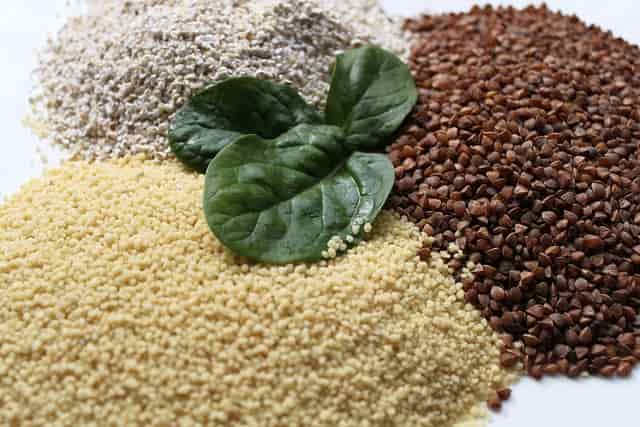Buckwheat is referred to as common buckwheat. It is a flowering plant. Even though it’s named, this plant is not closely related to wheat. It is not a cereal, nor is it even a member of the grass family. Buckwheat is connected to sorrel, knotweed, and rhubarb.
It is known as a pseudocereal because its seeds’ culinary use is the same as cereals. As it has high starch content. It is considered a superfood because the whole grain is highly nutritious. Buckwheat contains diverse phytochemicals such as rutin, tannins, catechin-7-O-glucoside in groats, and fagopyrins.
Nutrition Facts of Buckwheat
Buckwheat is energy-dense and is high in various vitamins and minerals. 100 g of buckwheat contains the following nutritional facts:
- Calories: 343 kcal
- Carbohydrates: 71.5 g
- Dietary fiber: 10 g
- Fat: 3.4 g
- Polyunsaturated: 1.039 g
- omega‑3: 0.078 g
- omega‑6: 0.961 g
- Protein: 13.25 g
- Vitamin B1: 9%
- Vitamin B6: 16%
- Calcium: 2%
- Copper: 55%
- Iron: 17%
- Magnesium: 65%
- Manganese: 62%
- Phosphorus: 50%
- Potassium: 10%
- Selenium: 12%
- Zinc: 25%
Health Benefits of Buckwheat
1. Improves digestion
Buckwheat is loaded with fiber. As per studies, dietary fiber is a plant-based carbohydrate that cannot be completely broken down by human digestive enzymes. While the fiber supports the intestines in digesting food efficiently. It helps food move through the digestive tract. Buckwheat even contains vitamin B3. This vitamin is important for converting carbohydrates, fats, and proteins into energy for the body’s cells to use. The superfood can even support weight loss and prevent cardiovascular disease. However, buckwheat is a good source of fiber and niacin which makes it a good choice for digestive health.
2. Manage diabetes
Buckwheat contains complex carbohydrates. This type of carbohydrate can help an individual to manage their blood glucose levels. Research says that the body takes longer to break down complex carbohydrates than simple carbohydrates. This process slows down digestion and helps keep blood sugar levels stable for longer. Thus more studies id needed regarding this.
3. It’s gluten-free
Buckwheat is naturally gluten-free. This makes this superfood suitable for people who are suffering from a disorder such as celiac disease, non-celiac gluten sensitivity, or dermatitis herpetiformis. However, make sure to check the labels before purchasing buckwheat products. Because some commercial products can be made using buckwheat combined with wheat and therefore will not be gluten-free.
4. Healthy for bones and teeth
Buckwheat contains a good amount of magnesium and calcium. Which is good for the formation of bones and teeth. According to studies, calcium is a mineral that makes bones stay strong. Our body removes a small amount of calcium from bones. So it is important to consume calcium rice food.
5. Provide energy
Buckwheat is a good source of vitamin B1. Our body uses this vitamin for energy. It even helps in carbohydrate metabolism which means it will break down the carbs for the body cell to use.
6. Healthy for bones and teeth
Buckwheat contains a good amount of magnesium and calcium. Which is good for the formation of bones and teeth. According to studies, calcium is a mineral that makes bones stay strong. Our body removes a small amount of calcium from bones. So it is important to consume calcium rice food.
7. Helps in hair growth
Nowadays many people face hair-related problems such as hair fall, and low hair growth. Buckwheat helps in solving such issues. This superfood has complex carbs, vitamin B, and zinc.
